Recovery as a Journey, Not a Destination
Recovery is often misunderstood as a singular event—a moment of epiphany or a miraculous breakthrough. However, the more profound truth is that recovery is an ongoing process, a commitment to lifelong change and personal development. This article delves into the multifaceted journey of recovery, exploring its complexities, stages, and the continuous effort required to maintain sobriety and mental health.
The Essentials of a Successful Recovery
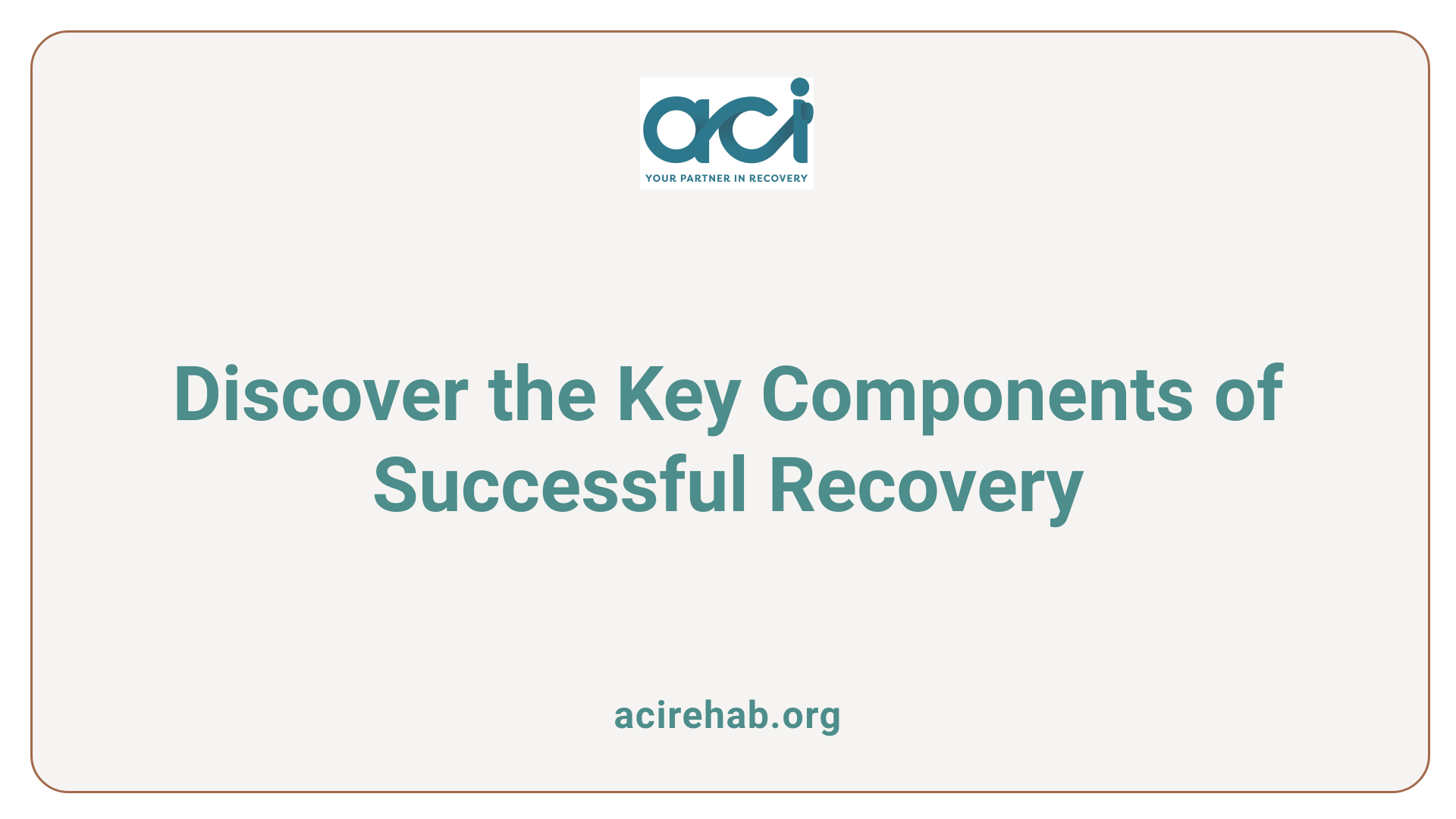
What are the components of a successful recovery?
A successful recovery is built on several fundamental components: acceptance, honesty, commitment, support, and personal growth. Each of these plays a crucial role in navigating the complexities of overcoming addiction.
-
Acceptance involves recognizing the addiction and understanding the necessity of seeking help.
-
Honesty is essential for being truthful about one’s treatment needs and the support required from family and friends.
-
Commitment is critical for engaging in recovery programs and striving toward long-term sobriety, fostering resilience in the face of challenges.
-
Support can derive from various sources, including inpatient and outpatient programs, peer-led groups, and community resources. This external assistance reinforces mental health stability and aids in maintaining recovery.
-
Personal Growth signifies a lifelong journey that encourages self-care and the development of coping strategies to effectively manage triggers and reduce relapse risk.
Importance of personal growth and support systems
Personal growth and a robust support system are intertwined elements in the recovery process.
-
Personal Growth fosters resilience and self-awareness, enabling individuals to reflect on their experiences and learn from setbacks. It promotes the pursuit of new hobbies, skills, and interests that replace previous compulsive behaviors.
-
Support Systems provide a safety net for those in recovery, offering encouragement during difficult times. Family members, friends, counselors, and support groups create an environment where individuals feel understood and valued, which can significantly impact recovery outcomes.
Together, these components create a comprehensive framework for successful recovery, allowing individuals to reclaim their lives and foster a healthier future.
Navigating the Dynamic Stages of Recovery
The stages of recovery from addiction
Recovery from addiction is a dynamic and multi-faceted journey, often divided into three essential stages: abstinence, repair, and growth. Each stage presents unique challenges and milestones that individuals must navigate.
Abstinence, repair, and growth phases
-
Abstinence: This initial stage focuses on the commitment to stop substance use. Here, individuals overcome physical dependence and learn to manage cravings through various coping strategies. It’s a critical foundation for the recovery process.
-
Repair: In this stage, individuals work on healing the damage addiction has caused in their lives, including relationships and self-worth. Therapy and self-reflection play pivotal roles in this phase, helping restore balance and cultivate self-esteem.
-
Growth: Occurring typically three to five years post-abstinence, the growth stage emphasizes personal development. Individuals set and achieve new goals, build healthy relationships, and find purpose in life. This holistic approach ensures recovery is viewed as an ongoing journey, not just a final destination.
The Role of Awareness and Mindfulness in Recovery
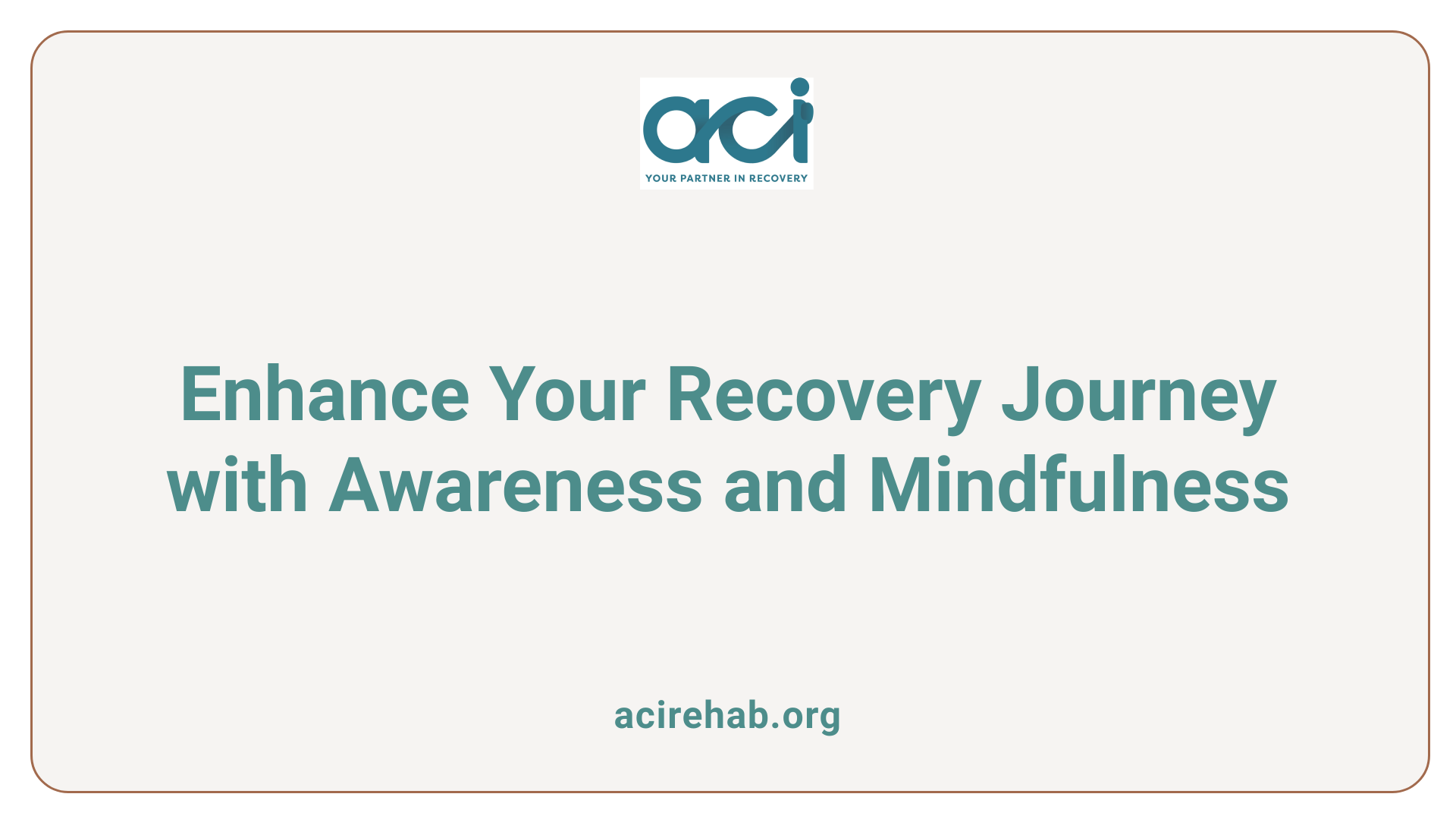
The significance of awareness in recovery
Awareness of one’s thoughts and behaviors is essential in overcoming addiction. This self-awareness allows individuals to identify automatic reactions to stress and emotions, which often lead to relapse. Recognizing these patterns is crucial for implementing effective coping strategies and making lifestyle changes necessary for long-term sobriety.
Techniques like therapy and journaling in increasing awareness
Various techniques can enhance awareness during the recovery process.
- Therapy: Engaging in therapy provides a safe space to explore thoughts and feelings. It encourages reflection and helps individuals understand underlying issues contributing to their addiction.
- Journaling: This method promotes self-discovery by allowing individuals to articulate their experiences, thoughts, and emotions. Writing enables self-reflection, making it easier to track progress and set goals for recovery.
Both techniques play a significant role in fostering mindfulness, ultimately supporting individuals on their recovery journey.
The Complexities of Relapse as a Process
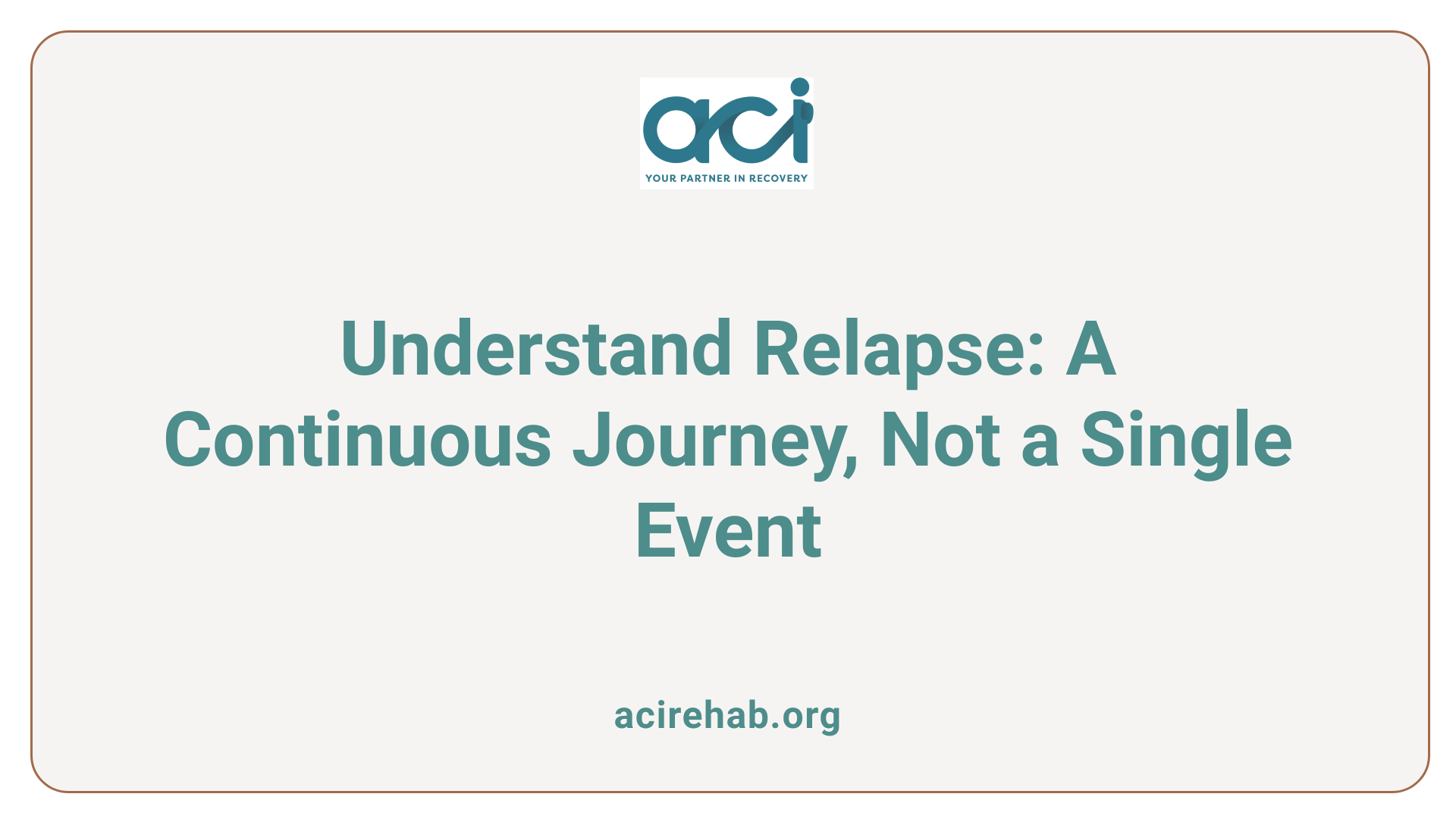
Understanding relapse as a process
Relapse is best understood as a process rather than a singular event. It often begins subtly, evidenced by shifts in feelings, thoughts, and behaviors. These early indicators can manifest as compulsive behaviors or emotional distress, eventually leading to cravings for substances. Understanding this progression is critical for individuals on the recovery journey. Recognizing the nuances of one’s emotional state can help in identifying potential relapses before they escalate.
Strategies for preventing relapse
To effectively prevent relapse, individuals must commit to their recovery and develop a structured plan. This plan should include:
- Coping strategies: Identify and practice techniques for managing emotions and triggers.
- Self-awareness: Regularly reflect on thoughts and behaviors that could signal an impending relapse.
- Support Network: Establish a strong support system comprising friends, family, and support groups.
- Distraction Techniques: Engage in positive activities to divert attention away from cravings, such as hobbies or exercise.
By employing these strategies, individuals can strengthen their recovery framework and enhance their resilience against the challenges that come with overcoming addiction. Celebrating each step forward aids in reinforcing positive behaviors, fostering hope, and supporting long-term sobriety.
Determining Your Path: Active vs. Passive Recovery
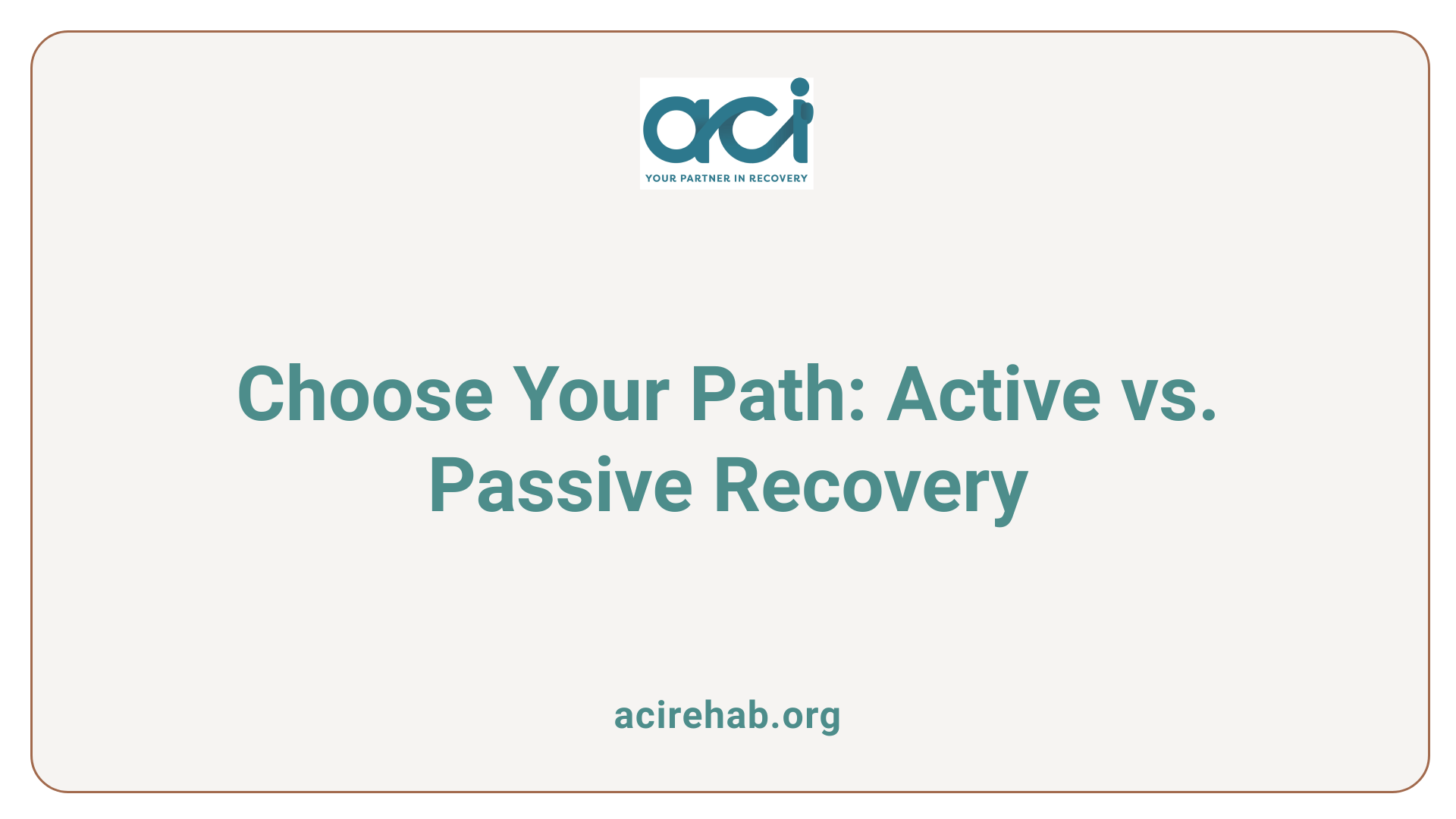
What are the two types of recovery processes?
There are two ways to recover from alcohol use and substance use disorders: passively and actively.
- Passive recovery involves simply abstaining from drugs or alcohol without formal treatment. This may work for some but often lacks the support needed to navigate underlying issues.
- Active recovery, on the other hand, emphasizes both abstinence and professional care. This approach entails engaging with counseling, therapeutic techniques, and support groups that address the root causes of addiction.
Importance of professional care in active recovery
Active recovery presents numerous benefits. Here are some critical points:
- Structured Support: Professional guidance provides a framework for recovery, making it easier to tackle emotional and psychological challenges.
- Skill Development: Therapy offers essential coping strategies, helping individuals effectively manage cravings and stressors.
- Relapse Prevention: Active recovery equips individuals with tools to identify triggers and maintain sobriety.
Choosing between these paths requires reflection on individual needs, circumstances, and support systems.
Cultivating the 3 P’s: Patience, Persistence, and Perseverance
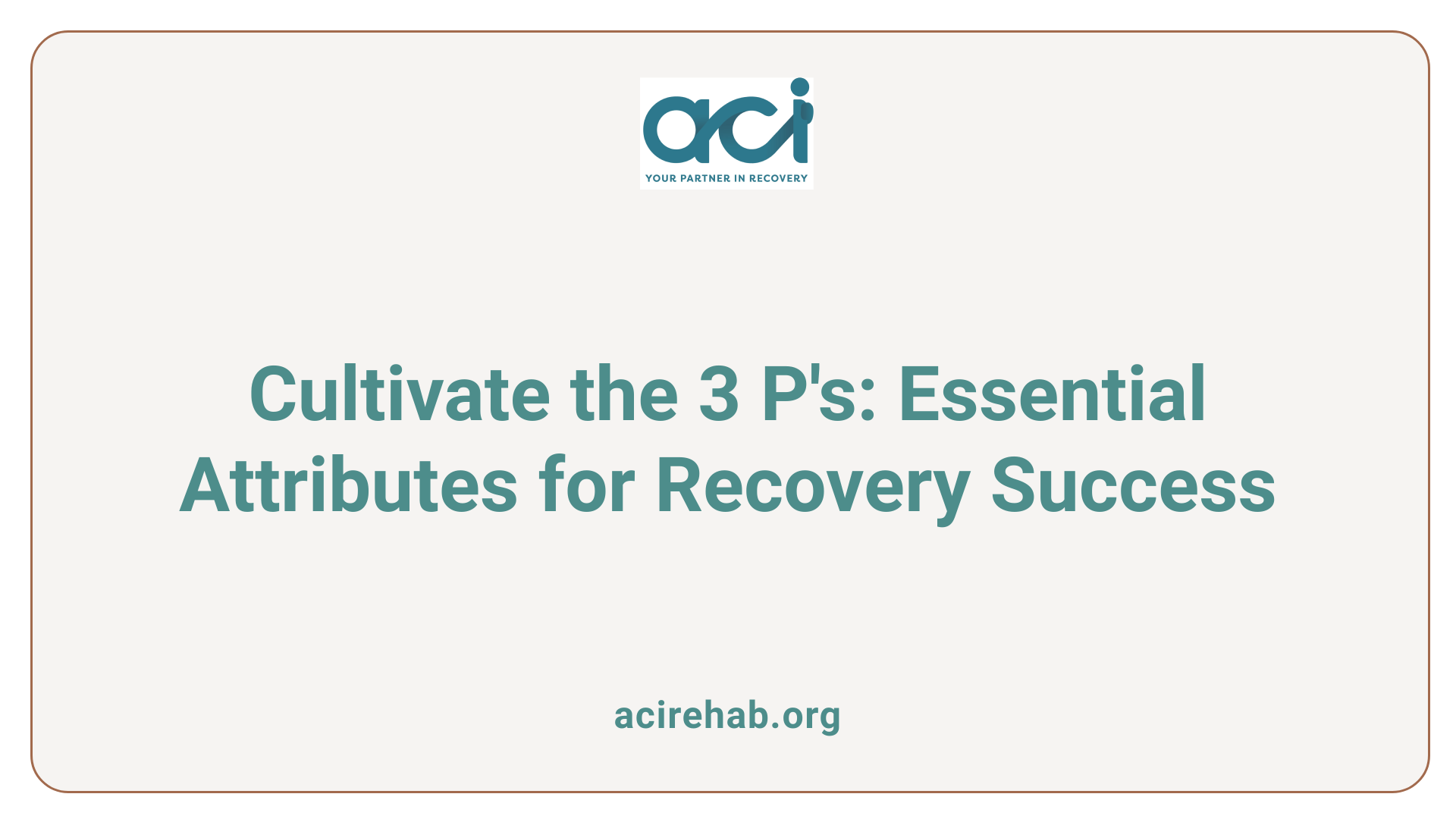
What are the three P’s of recovery?
The three P’s of recovery—patience, persistence, and perseverance—are key attributes that significantly impact the journey toward sobriety.
- Patience is crucial as it helps individuals understand that healing is a gradual process. Recognizing this allows for self-forgiveness and acceptance during difficult times.
- Persistence is equally important, especially when facing challenges such as relapses. It reinforces the commitment to recovery goals, ensuring individuals stay focused on their long-term objectives.
- Perseverance serves as the foundation of recovery. It empowers individuals to maintain their resolve amid setbacks, underscoring the importance of resilience in the recovery process.
To develop these attributes, individuals can set realistic goals, practice mindfulness, and cultivate a robust support network, all essential for preventing relapse and fostering enduring stability.
Embracing Recovery as a Lifelong Commitment
Recovery is a lifelong commitment that challenges individuals to grow, adapt, and embrace change continuously. It is a journey marked by progress and setbacks, requiring patience, persistence, and the unwavering support of a community. As we demystify the concept of recovery, recognizing it as an ongoing process, we open the door to more honest conversations and supportive practices that nurture health and well-being at every stage.
References
- Recovery is a Process, Not an Event
- Recovery: A Process Not An Event – The Wave Columbia
- ‘Recovery’ a process of change, a journey, not an event
- Recovery is a Process, Not an Event – Jennifer A Douglas
- A Process Not An Event – Dove Recovery
- Recovery: An Ongoing Process, Not a Destination
- RELAPSE IS NOT AN EVENT ITS A PROCESS – ThedaCare
- What Recovery is Not – The Estate
- [PDF] Addiction recovery: Its definition and conceptual boundaries.
- Addiction Recovery is a Process, not an Event – Hope Trust

